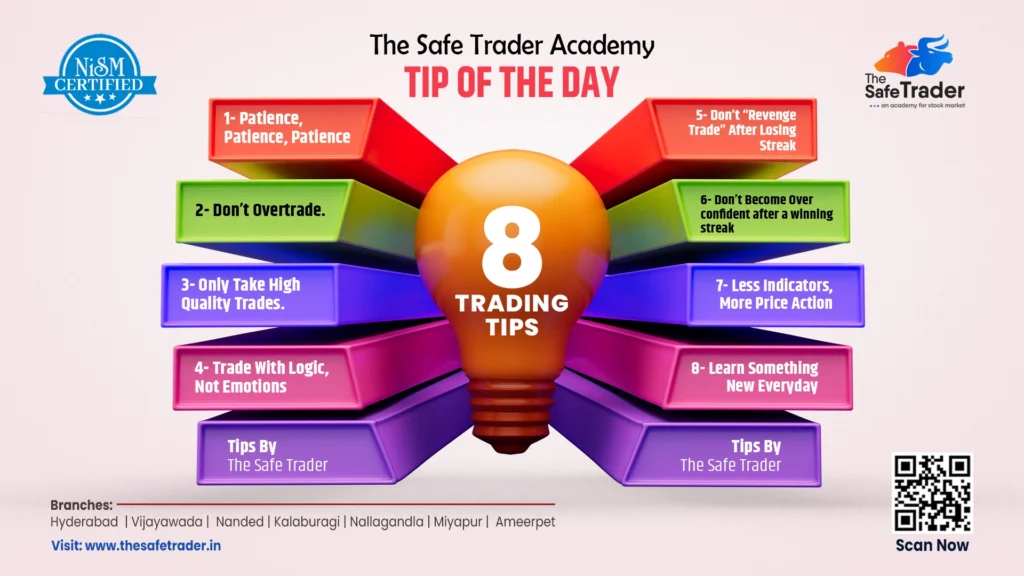8 Trading Tips That Can Transform Your Journey – From The Safe Trader Academy

Think of the stock market like a battlefield of emotion, self-discipline, and strategizing. Every trader walks in there hoping to find financial freedom, and only a few manage to do so in a consistent manner. Why? Because successful trading is not about being able to foresee the market; it is about managing your own conduct. At The Safe Trader Academy, we believe in empowering traders beyond tools and charts, providing them also with the mindset and discipline needed for success. Thus we gathered these eight essential points of advice-anyone serious about learning to trade must have them on hand to be fully reminded of them each and every day. Let’s take a look at these points and discuss how they apply to real-world trading: 1. Patience, Patience, Patience. If you ask any successful trader about his most important asset, he would say patience instead of fancy indicators. Waiting for the right setup can feel boring when the markets are moving fast. But trading is a game of precision, not speed. Impulsive entries are a sure way to burn your capital. With the benefit of being patient, you can ensure that you get in at good levels and always exit wisely. It puts you above FOMO (fear of missing out) and gives you the slight advantage that most traders lack. ✅ Tip: If you feel the urge to enter a trade without a solid reason, step back. Boredom should never lead to a trade. 2. Don’t Overtrade More trades ≠ more profits. Usually, overtrading occurs because of boredom, revenge, or overconfidence. Every trade should have a setup, a risk-reward ratio, and a reason for entering a trade. Think quality versus quantity. 💡 Analogy: A sniper takes one shot after hours of waiting; a machine gun sprays and prays. Be a sniper. 3. Only Take High-Quality Trades Every trade carries risk. Why risk your capital on a set-up that has a low probability of success? A high-quality trade is one that fits your strategy, market structure, time frame, and risk parameters. In other words, it is not just a trade to make money but to make smart trading decisions. Before you enter a trade, ask yourself the following questions: 4. Trade With Logic, Not Emotions Most losses don’t come from the market—they come from ourselves. Emotional states such as fear, greed, anger, or euphoria have the power to cloud one’s judgment. A trader must develop an unemotional approach to decision-making if he wants to succeed: trade with data, logic, and discipline. 🚫 Don’t: ✅ Do: 5. Don’t “Revenge Trade” After a Losing Streak Everyone loses. Even the best traders. How they handle it distinguishes them. Revenge trading — trying to win money back quickly — leads to bigger losses. It is emotional, irrational, and destructive. 📌 Rule: After 2 or 3 losses in a row, stop, review your trades and regain emotional control. 6. Don’t Become Overconfident After a Winning Streak Confidence is good. Overconfidence is dangerous. After a few wins, many traders go ahead and increase their lot sizes or worse, take some riskier entries and may even start ignoring their system for obvious reasons. That would be in the market coming down on them. Keep your feet on the ground. Be humble. 🧠 Reminder: A recent profit does not offer any guarantee about future profits. 7. Less Indicators, More Price Action You and I don’t need 10 indicators to analyze a chart. Too many indicators, actually, cause confusion and paralysis. Learn to read price action: candlesticks, support/resistance, trendlines, and volume. These are the languages of the market. ✅ Suggestion: Keep to 1 or 2 indicators that complement your price action thesis. Keep your charts clean. 8. Learn Something New Everyday The best traders are lifelong students. Markets change. New patterns emerge. Technology develops. Thus, learning should be set as a daily chore; read, watch, review, and reflect. Learning Ideas: Why Follow These Tips? Following these 8 trading principles can help you: Whether you’re day trading, swing trading, or investing, these tips will help you operate with clarity and confidence. Final Words: Trading is a Journey, Not a Sprint These tips are your daily compass, guiding you through the ups and downs of trading. Whether you’re just starting or have years of experience, these principles will help you build a strong, consistent, and professional trading routine. The Safe Trader Academy, with certified trainers and real-market exposure, is committed to helping you become a safe and confident trader.
